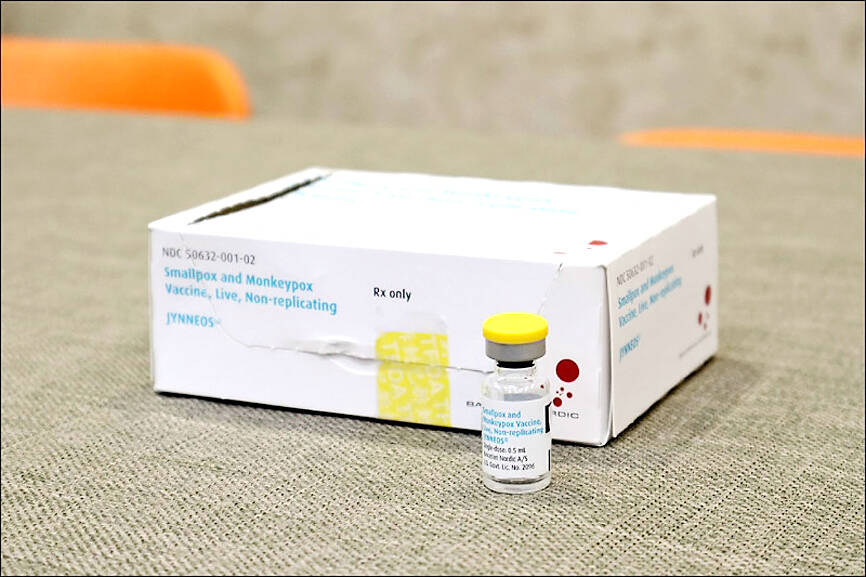The Centers for Disease Control (CDC) yesterday announced new guidelines to respond to a local mpox outbreak, allowing people who are suspected or confirmed to have the disease to self-isolate if they report no severe symptoms, are not in a vulnerable group and can reside in a separate room.
The protocols for mpox — a condition formerly known as monkeypox — were announced to healthcare professionals on Thursday.
People suspected to be infected by mpox, but deemed to be at low risk, should practice self-health management until test results are obtained, the CDC said.

Photo courtesy of the Centers for Disease Control
Reporting of suspected and confirmed cases remains mandatory, it added.
Mpox patients who do not need hospitalization must complete two stages of self-health management before being allowed to return to daily life activities, the CDC said.
During the first stage, cases in isolation must remain at home, unless in need of supplies or medicine, or if visiting a hospital for an urgent medical need, it said.
When outside, a person with a confirmed case must wear a mask and fully cover rashes with bandages or clothing, avoiding public transportation as much as possible, especially during rush hours, the agency said.
The second stage begins after being free of fever for 72 hours, free of rashes for 48 hours, having no oral membrane symptoms and no scabbing over old rashes on the face, arms or hands.
During this stage, those recovering from the infection can go to work or school, and make necessary outings from home, although the measures regarding masks, clothing and public transportation still apply, the CDC said.
After being free of fever for another 72 hours, free of rashes for 48 hours, and with no other of the above symptoms, a person can be considered free of the disease and return to regular life, it said.
The CDC reported that 22,235 people had registered for mpox vaccines via the government platform as of Thursday.
The deadline for registration passed yesterday.
Separately, influenza vaccines are to be added to a subsidy scheme, making the shots available for free to residents and caretakers at community-based care centers for people with mental and physical disabilities, the Ministry of Health and Welfare said yesterday.
The Advisory Committee on Immunization Practices put forward the measure due to concerns that residents in community-based care could be vulnerable to sickness due to their diminished capacity, the ministry said.
The plan would make fully subsidized flu shots available to 2,000 people, the ministry said.
The subsidy scheme for the flu vaccine includes adults aged 50 and older, medical workers, pregnant women, the very young, educators dealing with young children and the immunocompromised, among others, it said.
The ministry and other government offices are to procure an estimated 6.99 million doses by the end of the year, it said.

Actor Darren Wang (王大陸) was questioned by prosecutors for allegedly orchestrating an attack on a taxi driver after he was allegedly driven on a longer than necessary route in a car he disliked. The questioning at the New Taipei City District Prosecutors’ Office was ongoing as of press time last night. Police have recommended charges of attempted murder. The legally embattled actor — known for his role in the coming-of-age film Our Times (我的少女時代) — is under a separate investigation for allegedly using fake medical documents to evade mandatory military service. According to local media reports, police said Wang earlier last year ordered a

CAUTION: Based on intelligence from the nation’s security agencies, MOFA has cautioned Taiwanese travelers about heightened safety risks in China-friendly countries The Ministry of Foreign Affairs (MOFA) yesterday urged Taiwanese to be aware of their safety when traveling abroad, especially in countries that are friendly to China. China in June last year issued 22 guidelines that allow its courts to try in absentia and sentence to death so-called “diehard” Taiwanese independence activists, even though Chinese courts have no jurisdiction in Taiwan. Late last month, a senior Chinese official gave closed-door instructions to state security units to implement the guidelines in countries friendly to China, a government memo and a senior Taiwan security official said, based on information gathered by Taiwan’s intelligence agency. The

Taiwan Semiconductor Manufacturing Co (TSMC), the world’s largest contract chipmaker, said yesterday that it is looking to hire 8,000 people this year, at a time when the tech giant is expanding production capacity to maintain its lead over competitors. To attract talent, TSMC would launch a large-scale recruitment campaign on campuses across Taiwan, where a newly recruited engineer with a master’s degree could expect to receive an average salary of NT$2.2 million (US$60,912), which is much higher than the 2023 national average of NT$709,000 for those in the same category, according to government statistics. TSMC, which accounted for more than 60 percent

President William Lai (賴清德) should protect Taiwan Semiconductor Manufacturing Co (TSMC), and stop supporting domestic strife and discord, former president Ma Ying-jeou (馬英九) wrote on Facebook yesterday. US President Donald Trump and TSMC on Monday jointly announced that the company would invest an additional US$100 billion over the next few years to expand its semiconductor manufacturing operations in the US. The TSMC plans have promoted concern in Taiwan that it would effectively lead to the chipmaking giant becoming Americanized. The Lai administration lacks tangible policies to address concerns that Taiwan might follow in Ukraine’s footsteps, Ma wrote. Instead, it seems to think it could